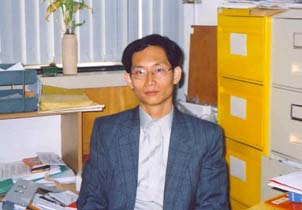
Manufacturers face environmental challenge
By Primrose Che
|
|
| Kwan Fung, coordinator of economics at UMac. |
China has finally entered the World Trade Organization. There is a good chance that the country's manufacturing industry will expand. However, environment-related problems may be a huge obstacle to the growth of China's manufacturing industry.
In recent years, buyers in Europe are more aware of environmental problems that arise when products are being manufactured. In some European Union countries, an environmental protection label system has been set up for the manufacturing industry. If the goods that are exported to a EU member country fail to meet the environmental protection requirements, they would not be allowed to get into the country. Such measures are adopted not only in Europe but also in the United States.
The problem is that the label requirements are not set by European governments. They are adopted voluntarily by European agents and companies. As a result, manufacturers in China usually pay little attention to them. Wilson Chu, a Macao resident who owns a textile company in Zhuhai, said, "We just do what the government requires us to do, and now this is not enough."
Not long ago one manufacturer in Jiangsu province exported his clothing to a EU country; the zip material was found to exceed the lead limit. In the end, all the goods couldn't be exported. This led to a loss of one million dollars.
Starting from the 1990's, strict limits have been adopted on the use of nitrogen, nickel, cadmium, pesticide and chloride organic
compounds in European countries. And the toughest country is Germany.
Chu said, "The trend of the manufacturing industry changes; people now do not only focus on the quality of goods, they also want goods that would not do harm to our environment."
Kwan Fung, coordinator of economics in the University of Macao, said, "From the conspiracy point of view, it is believed that by imposing this standard, the EU protects its own markets. But from the economic point of view, it is only re-allocation of resources."
Kwan added, "As long as China trades with EU, I believe that China will try its best to meet the requirements of environment protection labels, and that China can easily reach the required standard."
Annie Wong, a third-year student of FBA, also agreed, "That's good to care about our world in different aspects. I'm glad to see that environmental protection labels have been set up in different countries."